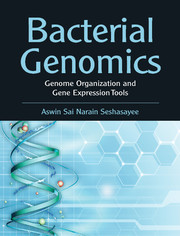Description
Bacterial Genomics
Genome Organization and Gene Expression Tools
Author: Seshasayee Aswin Sai Narain
Language: English
Subject for Bacterial Genomics:
Publication date: 03-2015
230 p. · 16.1x24.3 cm · Hardback
230 p. · 16.1x24.3 cm · Hardback
Description
/li>Contents
/li>Biography
/li>
The study of bacterial genetics has revolutionised with the development of genome sequencing, which let us catalogue the gene content of various clinically and industrially important bacteria and opened up the field of comparative genomics. The research findings on bacterial genetics were further enhanced by the development of allied techniques that allowed interrogation of the interactions and functions of the many components of the genome. These developments accelerated with the widespread adoption of quantitative deep-sequencing approaches. This process allowed both comparative and functional genomics on an unprecedented scale by presenting powerful tools to investigate multiple layers of bacterial adaptation and evolution. This book presents the application of genomic tools to examine bacterial adaptation. The emphasis is on data analysis and interpretation. Much of the material is drawn from the recent, primary literature, which is the most powerful tool in the cutting-edge and fast-growing field of bacterial research.
List of figures; Acknowledgements; 1. Introduction: bacterial genomes and gene expression; 2. Comparative genomics in the era of Sanger sequencing; 3. Studying bacterial genome variation with microarrays; 4. Studying bacterial genomes using next-generation sequencing; 5. Genome-scale analysis of gene expression and its regulation in bacteria; 6. DNA methylation in bacteria: a case for bacterial epigenetics; Index.
Aswin Sai Narain Seshasayee obtained his B. Tech. (Industrial Biotechnology) in 2005 from Anna University, Chennai, India and PhD (Molecular Biology) in 2009 from the University of Cambridge, UK in the EMBL International PhD Programme at the European Bioinformatics Institute (EBI), Cambridge, UK under the supervision of Nicholas M. Luscombe. After a short postdoctoral stint at the EMBL-EBI, Cambridge, UK, he joined the National Centre for Biological Sciences, Bangalore, India, where he is currently working. He is a recipient of the Ramanujan Fellowship of the Department of Science and Technology, Government of India. He has published a number of articles in international journals.
© 2024 LAVOISIER S.A.S.

